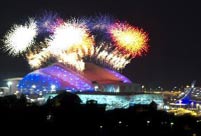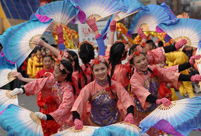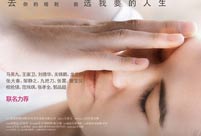 Turnip sculptures amaze tourists in Qingdao
Turnip sculptures amaze tourists in Qingdao Chinese ship formation conducts live fire training in West Pacific
Chinese ship formation conducts live fire training in West Pacific
 China comes in third at figure skating team event
China comes in third at figure skating team event
 China's teenager skater Yan shines at his Olympic debut
China's teenager skater Yan shines at his Olympic debut
 Taiwan-born actor stars on US TV series
Taiwan-born actor stars on US TV series
 Chinese Lunar New Year gift from abroad
Chinese Lunar New Year gift from abroad Chinese champions of Winter Olympic Games
Chinese champions of Winter Olympic Games  Zhang Yimou fined 7.48 mln for over-production
Zhang Yimou fined 7.48 mln for over-production
 Top 10 timeless female Chinese stars
Top 10 timeless female Chinese stars
BEIJING, Feb. 13 -- Chinese may face more traditional and poetic holiday options on this year' s Valentine' s Day, February 14, as it happens to be the Lantern Festival, which falls on the 15th day of the first month of the Chinese lunar calendar.
Discussions are getting heated online about how to split the celebrations between lovers and parents in China, as the Lantern Festival, which marks the last day of the lunar New Year celebration, is conventionally regarded as a chance for family gathering.
ROMANTIC LEGEND
But some have dug into the festival' s origin and found that it was truly a romantic day as ancient Chinese girls grew up at home and hardly had chance to go outside to meet people. But the Lantern Festival was an exception. On that particular day, young women were allowed to go outdoors at night to see the lantern displays, offering them an opportunity to meet young men.
"Many legendary love stories start with an encounter on the Lantern Festival, so it can be viewed as a Chinese version of Valentine' s Day," said Wang Laihua, a Chinese traditional culture researcher with the Tianjin Academy of Social Sciences.
COLORFUL CELEBRATIONS
However, the traditional festival is not all about romance. Lion and dragon dances, acrobatic performances and fireworks are also features of this special day.
The Qinhuai River, a branch of the Yangtze River that runs through central Nanjing, east China's Jiangsu Province, used to be a red-light district famous throughout the nation in the Ming and Qing dynasties. Though shuttling boats with red lanterns and beautiful geishas were already historical things, the tradition of enjoying lanterns and guessing riddles along the river bank has been inherited till now.
Culture fiends can also find something more spectacular in Yu County, an ancient town 220 km west of Beijing. The tradition here for more than 300 years has been to fling ladlefuls of molten iron against the high brick walls. This splash of color is reminiscent of fireworks, although more memorable for those who brave the chilly weather.
The more adventurous couples could try a trek through the Emerald Valley, at the northern foot of Huangshan, east China's Anhui Province.Dotted with turquoise blue pools, it is the setting for scenes in the Oscar-winning film "Crouching Tiger, Hidden Dragon".
The 6-km-long valley was rather risky before it was officially opened to public. In 1986, a group of 36 young travelers got lost there. They helped each other to safety, and 20 of the 36 later became couples. Two years later, they revisited the valley and signed a letter appealing to the local government to change the valley' s name to Lovers Valley.
SWEET SNACKS
Celebrations vary from place to place, but eating yuanxiao, or sweetened rice dumplings, is common across the country and has passed down through the generations.
Just as Western influences can be tasted in the modern mooncake, the traditional Chinese delicacy eaten on the Mid-Autumn Festival, chocolate and yuanxiao are one of many new pairings for the Lantern Festival
Chocolate is widely regarded as a relatively recent introduction to China, but it was first recorded as entering the country back in 1705, when Roman Catholic Pope Clement XI dispatched envoys who presented 150 chocolates to Emperor Kangxi of the Qing Dynasty.
However, until the late 1980s when multinational manufacturers entered the market, most of the "chocolate" eaten in China was made with cocoa butter substitutes, creating nothing more than a sweet, brown substance. Helped by slick and widespread marketing campaigns, real chocolate has now become part of the culture and the diet, as has Valentine' s Day itself.
In contrast, yuanxiao, commonly called tangyuan in south China, have evolved over centuries and are still adapting, with new ingredients, to modern tastes.
Made with rice flour and sweet fillings, they symbolize family gatherings and happiness and are easy to cook: simply put them in a pot of boiling water for a few minutes and eat as a dessert.
According to folklore expert You Guoqing, though most Chinese families still eat yuanxiao on the Lantern Festival, homemade yuanxiao are becoming rarer. Frozen yuanxiao sold in supermarkets are gaining in popularity for their variety of fillings and convenience, as many people have less time to make them.
Yuanxiao with chocolate or rose fillings can also be found. A manager surnamed Li at Huguo Temple Snacks shop said yuanxiao with chocolate or rose fillings comprise almost half of the 150 kilos sold every day. Sales of rose-filled yuanxiao had doubled on last year.
"I think this is a perfect mix," said a young man buying rose-filled yuanxiao as a gift for his girlfriend' s family.
LOVE BUSINESS
The last time when Lantern Festival coincided with Valentine' s Day was in 1995, when many Chinese were still too conservative to talk about love openly. People did not understand well about Valentine' s Day at that time and some even translated it into "Lover' s Day" or "Mistress' Day" .
But in the past two decades, attitudes have changed. "More Western festivals are becoming popular among young Chinese, and February 14 is a time of roses and chocolates, candlelit dinners and Valentine cards," said You.
Many young people said on social media that they would marry on Friday, hoping to bask in the good fortune of two festivals. It is estimated that the number of couples getting married on February 14 would be much higher than previous years.
However, many also complain that Valentine' s Day is more about money rather than romance now in China. The prices of flowers soar, restaurants are packed and online sales grow vigorously.
Owners of flower shops will make a historical big fortune this year. According to "Laojiang" , a flower shop owner in Hangzhou, an ordinary rose will be sold at least 15 yuan (about 2.50 USD), up 30 percent from last year, and he estimates that the price will get higher as the festival approaches.
Some people also believe that the two festivals meet on the same day representing a union of love, especially for film buffs who fancy a quiet evening in with a special person that night.
Chinese cinemas are always popular on Valentine' s Day, with three romances scheduled to screen this year: "Beijing Love Story" , "Bends" and "Unexpected Love" .
If the lovers were fed up with the crowded ticket box, they could easily find a coffee shop and watch the classic love movies. Precious leisure and comfort would be provided there.
The touching stories on the screen infiltrate into the young people' s real world. When the movie ended, love would happen.
 Highlights of opening ceremony of Sochi 2014 Winter Olympic Games
Highlights of opening ceremony of Sochi 2014 Winter Olympic Games Highlights of Chinese New Year celebrations around the world
Highlights of Chinese New Year celebrations around the world  Chinese ship formation conducts live fire training in West Pacific
Chinese ship formation conducts live fire training in West Pacific Sanya bans skinny dipping in public beach
Sanya bans skinny dipping in public beach Top 20 most beautiful Chinese stars
Top 20 most beautiful Chinese stars  PLA navy conducts landing drills in South China Sea
PLA navy conducts landing drills in South China Sea  Snowscape in Chinese New Year
Snowscape in Chinese New Year Top 10 timeless female Chinese stars
Top 10 timeless female Chinese stars Top 10 Chinese films in 2013
Top 10 Chinese films in 2013 New Year greetings from Chinese nationals in Africa
New Year greetings from Chinese nationals in Africa Miss Chinese Int'l Pageant 2014 held in Hong Kong
Miss Chinese Int'l Pageant 2014 held in Hong Kong Severe coldness freezes large parts of China
Severe coldness freezes large parts of China  Beautiful moments of Sochi
Beautiful moments of Sochi  It's not just performing this year
It's not just performing this year Selfies of "Little colorful flag" girl unveiled
Selfies of "Little colorful flag" girl unveiled Day|Week|Month